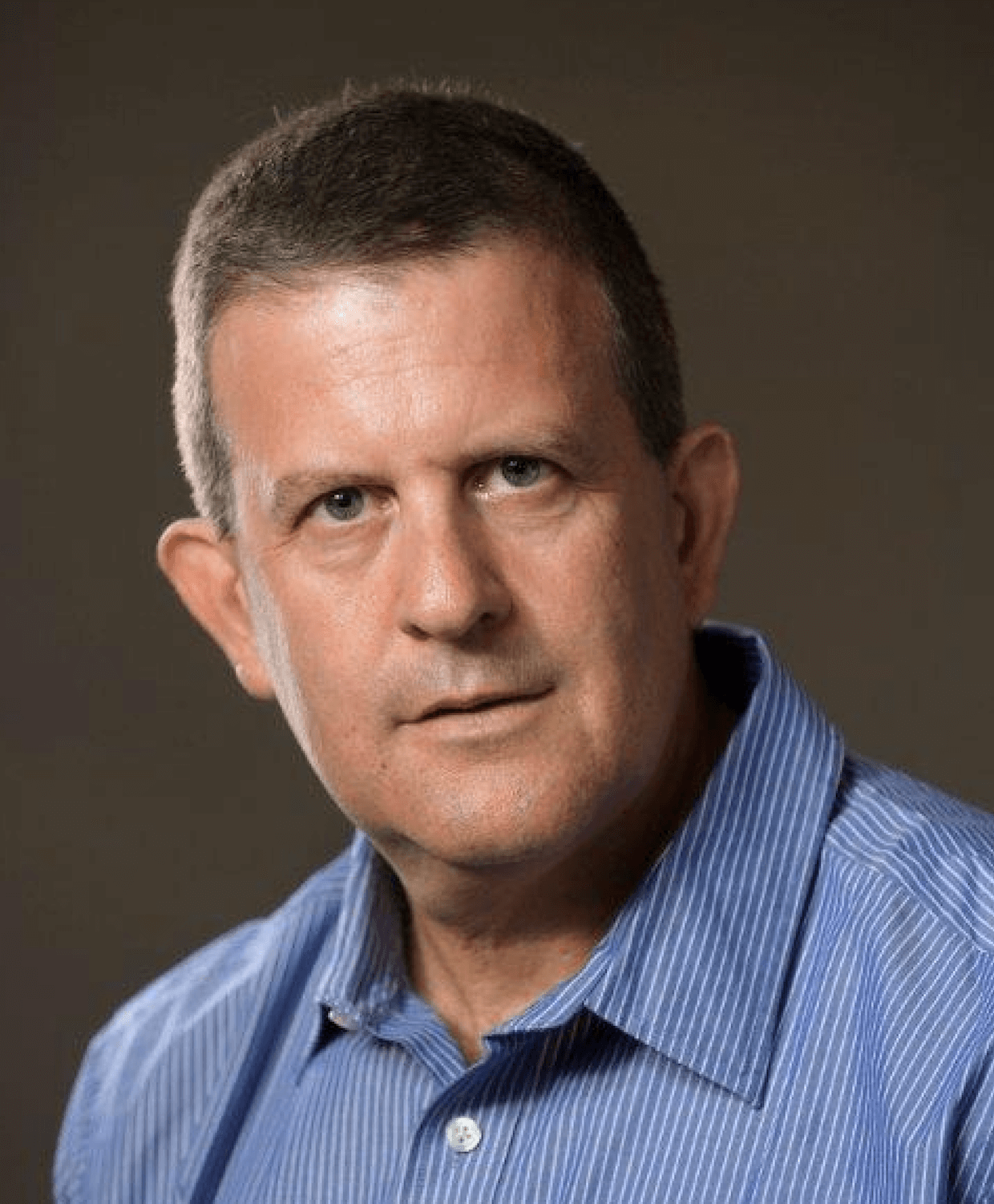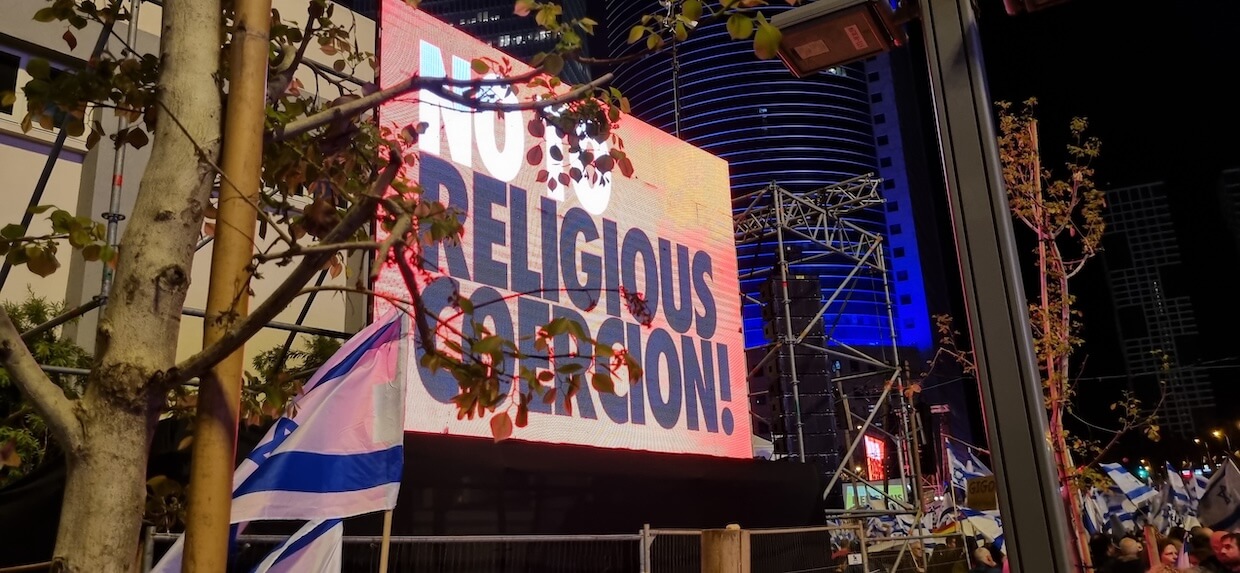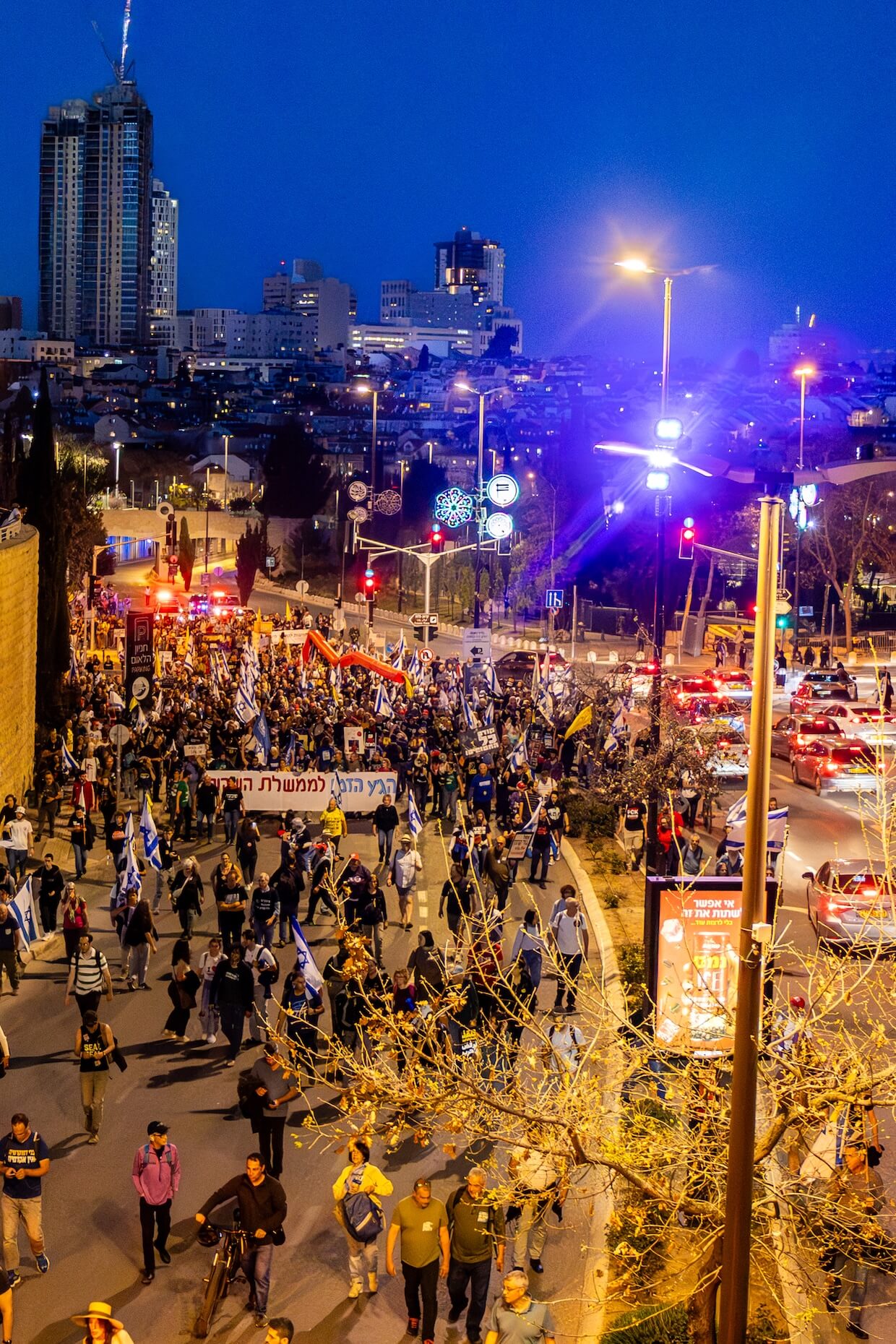In a candid and comprehensive interview with ECPS, Professor Guy Ben-Porat warns that Israel’s political rightward shift is not simply a strategic maneuver, but the product of deeper ideological currents. Describing the current coalition as “a unification of several forces,” Professor Ben-Porat highlights its populist hostility toward liberal institutions, minorities, and judicial independence. He draws direct parallels to Hungary and Poland, identifying a shared authoritarian trajectory. Professor Ben-Porat also reflects on how the October 7 attacks have further racialized political discourse, with Arab-Palestinian citizens facing intensified securitization. Yet, he sees hope in mass democratic mobilization: “Thousands of people have taken to the streets every week… the fact that many Israelis are still fighting for democracy means they haven’t thrown in the towel yet.”
Interview by Selcuk Gultasli
In a period marked by growing polarization, religious populism, and democratic backsliding, Israel’s political landscape has undergone a profound transformation. In a wide-ranging and timely interview with the European Center for Populism Studies (ECPS), Professor Guy Ben-Porat—an expert in comparative politics and political sociology at Ben-Gurion University of the Negev—offers a critical diagnosis of Israel’s sharp rightward turn. “It’s more than strategy,” Professor Ben-Porat asserts, describing the current government as “a unification of several forces that make a very strong right-wing government,” rooted in anti-liberalism, exclusionary nationalism, and religious traditionalism.
At the center of this transformation is a coalition led by Prime Minister Benjamin Netanyahu, flanked by ultra-Orthodox parties and far-right figures such as Itamar Ben Gvir and Bezalel Smotrich. Their political agenda, Professor Ben-Porat explains, has taken aim at core liberal-democratic institutions. “From the get-go, this government was determined to undermine the power of the Supreme Court… What they’re proposing is a majoritarian government that will stamp upon the rights of minorities.”
This encroachment on judicial independence is not merely an Israeli phenomenon. Professor Ben-Porat highlights the striking parallels with populist regimes in Hungary and Poland, noting that “Orbán and what happened in Poland before the last elections were good examples for Israel… this was a copycat.” The broader objective is to reconfigure Israeli democracy into a more ethnocratic and majoritarian model—where Jewish identity increasingly overrides civic inclusion and pluralism.
In a particularly sobering observation, Professor Ben-Porat warns that the October 7 Hamas attacks have only deepened the state’s securitized and racialized posture toward its Arab-Palestinian citizens. “There’s much more securitization of political statements and actions of Arab citizens,” he notes. And yet, despite populist figures like Ben Gvir hoping to use the crisis as justification for repression, Israel’s Arab citizens “did not play the game as expected”—remaining distant from Hamas and at times even risking their lives to protect Jewish compatriots.
Still, Professor Ben-Porat cautions that democratic decline is not inevitable. “Thousands of people have taken to the streets every week. That should not be discounted.” Though the protest movement remains largely focused on “Jewish democracy,” he sees the potential for it to evolve, to challenge systemic inequalities and the ongoing occupation. “It’s hard to be hopeful now,” he concludes, “but the fact that many Israelis are still on the streets, still fighting for democracy, means they haven’t thrown in the towel yet.”

Here is the lightly edited transcript of the interview with Professor Guy Ben-Porat.
It’s More Than Strategy: A Unified Assault on Liberal Democracy
Professor Guy Ben-Porat, thank you so very much for joining our interview series. Let me start right away with the first question: How do you understand the convergence of neo-Zionist ideology and populist rhetoric in the post-2022 electoral landscape, particularly under the Ben Gvir–Smotrich axis within Netanyahu’s coalition?
Professor Guy Ben-Porat: It’s a big question, with many terms—neo, Zionist, etc.—which I’m not sure I understand or use all of them. It’s a right-wing government that has several elements within it. Likud, Netanyahu’s party, is a populist party which has become an exclusionary populist party in recent years, centered on anti-Arab, anti-immigrant, and anti-liberal sentiments.
Alongside it are the ultra-Orthodox parties, which have a very special perspective on Israel’s future and on church–state relations. You mentioned Ben Gvir and Smotrich. This is a united party combining into an extreme right-wing party—maybe akin to some things you see among the extreme right in Europe. So, major populism is the main theme here. I think it’s a right-wing, religious government with populist elements within it.
To what extent can the recent rightward shift in Israeli politics be interpreted as a populist response to long-standing ethnic and religious cleavages rather than a mere electoral strategy?
Professor Guy Ben-Porat: I think it’s more than strategy. I think the government has a common interest in undermining some of the established democratic features of Israel—namely, the Supreme Court in particular. And if you look at the internal scene, or the internal politics, from the get-go, this government was determined to undermine the power of the Supreme Court and what we call the checks and balances. Now each part of the government has a different take on the Supreme Court.
For the ultra-Orthodox, the Supreme Court is perceived as liberal and as undermining their coalitional achievements, which they gain—particular gains for their own good—whether it is exemption from military service, whether it’s budgets for religious institutions, etc.
For the extreme right, the Supreme Court is perceived as slowing down the annexation of the West Bank and the territories. The Supreme Court is perceived as putting some blocks on the military and on the settlement movement—which, one could argue, it does not—but that’s the way they perceive it.
And for Netanyahu, being involved in a series of trials, the Supreme Court is perceived—or is depicted—as an attempt to remove an elected leader by the elites.
So each part of this government has its own take on democracy, kind of combining together into this coalition.
Now, what unites them is, first, a very right-wing perspective in terms of Palestinians and Arab citizens; a more religious attitude or more traditional attitude towards religion; and a strong dislike of what they describe as elites and liberal democracy. So all this together makes it more than a fluke, more than a conjecture. It’s a unification of several forces that make a very strong right-wing government.
Religion Is Used to Draw Boundaries—Not Just to Guide Lives
Does the growing prominence of religious populism in Israel suggest a broader transformation in the political culture, where the ethno-religious identity of “the people” overrides civic and pluralistic conceptions of citizenship?
Professor Guy Ben-Porat: I think here it’s a bit more complex, and that’s what we do—Dani Filc and I—in our work. For some of the religious right, religion is about demarcating boundaries. Religion is used as a way to define the Jewish state, to defend Jewish privileges, and to exclude those who are not Jewish. But if you look at their perception of religion as a way of life—as an ethical way of living—then some of them are not religious, or not religious in the way that orthodoxy perceives religion. To make this a bit more clear: if you look at issues like LGBTQ rights or issues about women’s rights within the Jewish camp, they can be somewhat liberal.
So, in this government, there is a clear divide between those for whom religion is a genuine way of life—shaping their daily practices, beliefs, and ethical system—and those who use religion primarily to draw boundaries and assert identity. Take, for example, the policy issue of exempting yeshiva students from military service: for the ultra-Orthodox, this is entirely natural and self-evident. For Likud members, however, it is far less obvious. That’s where you see differences between what religion is for these people.
Ehud Olmert, former Israeli Prime Minister, in his article published in Haaretz/The Guardian recently, warns of Israel’s potential international isolation and prosecution over war crimes, describing a state policy of starvation and indiscriminate violence. How does the normalization of such extreme policies reflect the convergence of populist ethno-nationalism with authoritarian state practices and what are the long-term implications for democratic institutions and minority rights in Israel?
Professor Guy Ben-Porat: I think we need to make a little separation of things. First, Olmert’s warning is true and real. Israel’s actions in Gaza are dangerous. Many civilian lives are lost, and one could say—in very careful terms—without good reason. Not that there’s ever a good reason, but this war has definitely gone to extremes.
Now, why is this war continuing? Well, I think there are some reasons. One: it’s the government’s policy. And for Netanyahu, as long as the war goes on, the government stays intact. It keeps the government together. If the war ends, then some of the more extreme elements of the government might pull it apart, which means that Netanyahu would have to stand trial without the protection of being Prime Minister. It means there’ll be new elections. It means that Jews will begin debating what happened on October 7th—who’s responsible for this debacle. So for the government, the continuation of the war serves several purposes.
For some, the war should be continued because “we should not stop before the final victory,” which I’m not sure what it means—but for them, it’s the annihilation of Hamas. And I’m not sure that’s even possible. For others, maybe we should end the war on better terms for Israel. Again, I have no idea what that means.
But you could say there’s a mixture of ideology—of extreme right-wing ideology—of political interests, and mainly the fact that the government, for reasons that relate to what I said before, has never really introduced a strategy for how to end this war. If you ask Netanyahu: when does this war end? What will be in Gaza? Who will rule Gaza? Where will Israel be? What’s the role of the Palestinian Authority? What’s the role of other countries? What’s going to happen in Gaza once this war ends? What are the goals of this war? What is the strategy? We don’t know.
A Coherent Network of Right-Wing Advocacy Is Shaping Israel’s Future

How has the increasing influence of religiously conservative diaspora-funded NGOs and settler movements shaped the neo-Zionist agenda, particularly under populist governance?
Professor Guy Ben-Porat: Within Israel, money from abroad is not a new thing. NGOs—from both the left and the right—are supported from abroad. That’s not a new phenomenon. The same goes for the government. The Jewish diaspora has always maintained strong ties with Israel and influenced Israeli politics.
You can see NGOs on the so-called left and on the right receiving funding from abroad. Now, from the right-wing perspective, it’s the money from abroad that’s financing the left. So if you look at the populist kind of discourse, it’s about international elites supporting leftist, anti-Zionist forces who are opposing the government. It depends on which side is telling the story.
But to be more precise, I think what we’re seeing today is a very strong connection between the Israeli right and the Trump administration, as well as right-wing organizations in Europe. That’s where you see, perhaps, a new development: a more coherent network of right-wing advocacy that also has influence on Israel.
In your analysis of ‘good citizenship’ among new religious movements, how do such actors reframe legitimacy within a populist framework that delegitimizes secular or liberal opponents?
Professor Guy Ben-Porat: There are several ways this is conducted. Begin with “good citizenship” in Israel—the republican equation, as we call it—has often been about military service. Many on the right pride themselves on being the foot soldiers: “We are carrying out the mission of defending Israel. We are paying the price in blood,” whether it’s through settlement in the West Bank or military service. Hence, we are the good citizens.
They blame the other side for not doing as much. By the way, statistics don’t necessarily support that, but that’s the claim. So being a good citizen is framed around military service and combat. That’s how they define good citizenship.
Now, this of course has implications for issues of gender and ethnicity—namely, for non-Jewish citizens. This whole concept of good citizenship is used by populists to describe themselves as the good, contributing, fighting citizens, in contrast to the “detached elites”—those who are global, more fluid, who can use their money to escape responsibility.
Now, this is a myth—a fable. The Israeli center-left has been fighting on the streets for democracy for two years now. So the whole notion of detached elites is complete baloney. But it makes for a compelling narrative on the right: We are the good citizens. We are the ones who sacrifice. We are truly committed to the country, while you—the elites—are global cosmopolitans. This, by the way, echoes classic anti-Semitic tropes once used in Europe against Jews. Put that aside—but the story they tell is that we are the good people, and they are the detached elites with less commitment to the country’s welfare.
A Different Government Might Have Chosen Strategy Over Messianic Dreams
Had a centrist or center-left coalition prevailed in the 2022 elections, how might the Israeli state have handled the aftermath of the October 7 attacks differently—in terms of military response, international diplomacy, and internal discourse?
Professor Guy Ben-Porat: It’s hard to talk about things that didn’t happen. The "what if" is always very difficult. I can say one thing: if the October 7th debacle had happened under a center-left government, the right would have used all its power to force that government out, to place the blame squarely on them, and to sell the narrative that this is what happens when you have a left-leaning government—one that is weak and unequipped to fight. A left-wing government would have been discredited to the bones.
That hasn’t happened with the right. Netanyahu’s government has been fighting for almost two years now to shed responsibility. “It’s not us, it’s the military, it’s the intelligence.” They’ve been working very hard since October 7th—October 8th even—to deflect responsibility.
Now, what would a different government do? Hard to say. But what a sensible one would do is, at some stage early in the war, begin to form a strategy. On October 8th, right after October 7th, we had very strong international support. We could have fought Hamas, brought an alternative government to Gaza, brought back the hostages, and started thinking of a new future for the Middle East. We could have pursued Middle East alliances—with the Saudis, with the Gulf countries. There were opportunities on the table. This government, because of its right-wing, messianic, and ultra-nationalist agenda, simply threw that out the window. What we would have had instead is maybe a strategy—not messianic dreams. A strategy.
Would an alternative government have challenged the securitization logic that you argue has long shaped Israeli-Arab relations, or merely adopted a more technocratic or liberal gloss?
Professor Guy Ben-Porat: Again, hard to tell. I would take anything that improves the current situation. Gloss might become, at some point, substance. But I think the previous government—at least on one issue that I’m researching, internal security—had a different approach.
We have an ongoing crisis within Arab neighborhoods in Israel. Arab citizens make up about 20% of the country’s population, and they account for more than 50% of the murders in this country. The numbers are skyrocketing.
The previous government, through an attempt to create a strategy, was able for the first time to slightly reduce the number of people murdered among Arab citizens. In this government, the police are in the hands of Itamar Ben-Gvir, an extreme right-wing nationalist and, if I may say, a convicted criminal. Under his office, the numbers have doubled since the last government. So yes, a different government could have made a difference.
Copying Orbán: Undermining Democracy in the Name of Sovereignty
To what extent is the judicial overhaul effort by the Netanyahu-led coalition part of a broader pattern of populist institutional capture akin to what we have seen in Hungary or Poland?
Professor Guy Ben-Porat: It’s been mentioned many times, and the comparison has been made by many people. The connection between Orbán and Netanyahu is well known. Netanyahu’s son has been advocating and has become something of a poster child for some of these movements. So there’s a strong relationship between the Israeli right and the right in Europe and the US.
To a large extent, this was the playbook of the right: undermine liberal democratic institutions and give more power to the government. Orbán—and what happened in Poland before the last elections—were good examples for Israel. And I think, to some extent, this was a copycat. Yes, we saw this in Europe; we can do the same things here. It’s a kind of logic that follows its own lead—it doesn’t really need the examples from abroad. Still, I think the fact that this is happening on a global scale has some meaning.
Do you view the weakening of judicial independence in Israel as a calculated step toward majoritarian rule under the guise of popular sovereignty? How does this resonate with your broader work on state-minority relations?
Professor Guy Ben-Porat: They’ve said it explicitly—so it’s not a mystery. Their position is clear: they want to transfer power from the judiciary to the government. That’s not a secret—it’s the stated policy of this government. The Supreme Court may have its faults, and liberal democracy can certainly be debated. But what they’re proposing is a majoritarian government that tramples the rights of minorities. Again, this isn’t hidden. Some members of the government openly declare that Israel is a Jewish state in which Jewish citizens should enjoy privileges over non-Jews.
Israel has long debated how to reconcile being both a Jewish state and a democracy. It’s an ongoing tension—these principles often clash. Liberal Israelis—and one can debate whether they were right or wrong—have tried to argue that the two can be balanced. A Jewish state, they’ve said, can still be fair toward its Arab citizens. It may not be perfect, it may have flaws, but the contradictions can be managed, even if not fully resolved.
Under the current government, however, there is a clear and explicit shift toward prioritizing the Jewish character of the state. If being both Jewish and democratic comes into conflict, their answer is unequivocal: it is a Jewish state, and democracy comes second. For some in this government, that’s not incidental—it’s ideological. That’s what they believe.
Annexation of Gaza Is No Longer a Whisper—It’s a Declared Agenda
Do you see a fundamental shift in the far right’s approach to governing Palestinians under occupation—moving from ‘managing’ the conflict to accelerating irreversible annexation?
Professor Guy Ben-Porat: Absolutely. And again, these are things that are being said explicitly. You don’t really have to search—it’s not hypothetical. These are statements made by Smotrich, Ben Gvir, and others: that it’s time to annex the West Bank. So, it’s almost obvious. The only thing that has prevented it so far is international pressure. But under Trump, they believed the time had come—an opportunity to do what they always wanted: annex the West Bank. They’ve announced plans to build more settlements, to use more force against Palestinians, to expel so-called top terrorists—which can mean many things. So while these ideas are not yet fully implemented as policy, they are being openly discussed.

Given the current political trajectory, do you believe Israel’s liberal democratic elements are in structural decline, or are there still viable pathways for democratic resilience—perhaps through civil society, judicial pushback, or international pressure?
Professor Guy Ben-Porat: I think the jury is still out on this question. For many years, we’ve been lamenting the death of the left-liberal spectrum in Israel. The prevailing notion was that these people were tired—they were busy with themselves, individualistic, global, cosmopolitan. While the right appeared united and committed, the liberal left seemed aloof and less engaged.
However, over the past two years, we’ve witnessed something remarkable: thousands of people have taken to the streets every week. I think that should not be discounted. I’m not sure who will win, but two or three years ago, if you had told Israelis there would be large weekly rallies in defense of democracy, most would have dismissed it as impossible. Yet, when Israelis perceived that democracy was in danger, they rose up.
There is still a question about how far and how open this movement is. For the moment, it is focused on Jewish democracy. It does not yet address the occupation or fully include the rights of Palestinian citizens—that remains on the margins of the demonstrators’ consensus. The movement is centered on defending Israel’s democracy, and to maintain broad support, it has set aside, at least for now, the occupation and non-Jewish rights.
However, once a movement like this begins to grow and starts to confront the deeper implications of occupation and inequality, then maybe there is room for optimism. It’s hard to be hopeful right now—given the war and two years of ongoing struggle—but the fact that many Israelis are still on the streets, still fighting for democracy, means they haven’t thrown in the towel yet.
Fear Is Driving Policy—But That’s Exactly What Ben Gvir Wants
To what extent does the current populist ascendancy reflect a systemic recoding of Israel’s founding ethno-religious cleavages into a majoritarian regime logic, rather than a contingent electoral maneuver?
Professor Guy Ben-Porat: I think it’s more contingent. We’ve had many years of cleavages and schisms that have come to the fore with the last elections, and we are seeing a very strong cleavage between center-left and right. But within those camps, there are divisions. People on both the right and the left can change their opinions.
Especially in the last 18 months—after October 7th—there has also been the fear factor. People are acting out of fear. Let’s look at the Palestinians, or Arab citizens, or the world. There is still a memory of October 7th. This trauma still lingers.
So, I think what needs to happen now is the restoration of hope and the development of a strategy—reaching out to people on the other side of the spectrum and trying to convince them that there is another option. Maybe then there’s room for change.
To answer your question: no, it’s not merely a contingency. It is the result of many years of struggles and cleavages. Netanyahu was able to position himself as a defender of “the true people” in a very populist sense. But the war has also somewhat shattered that image—being Mr. Security and managing the economy. So, while these shifts are, at the moment, tragic, they may in the future provide some room for change.
In the light of your work on the ‘shrinking of citizenship,’ how has the October 7 Hamas attack provided a discursive and policy framework for intensifying the racialized securitization of Arab-Palestinian citizens under the guise of national unity and collective trauma?
Professor Guy Ben-Porat: It’s a good question. And again, it has several layers that we need to look at. To begin with—yes, Israel became more securitized. People are more afraid, which, of course, also shapes opinions and perceptions. When you’re afraid, it’s very hard to think things through and look at the long term. In that sense, it’s become more securitized. For example, political dissent is much less tolerated. There’s much more securitization of political statements and actions of Arab citizens.
At the same time, Ben Gvir was expecting Arab citizens to join in the October 7th events. That would have given him the reason to use more force against them. So, from Ben Gvir’s perspective or hopes, October 7th provided an opportunity to crack down on Israeli Arab citizens. This has not happened. Arab citizens did not play the game as expected. They remained very detached from Hamas. On October 7th, they were saying, "That is not us. We don’t condone these things." More than that—among the hostages were Arab citizens, Bedouins from the Negev, who were taken by Hamas to Gaza, and some were killed by Hamas. Arab citizens on October 7th, in some cases, saved Jewish citizens.
The whole story became more complex. But now Gaza makes it more difficult—because those citizens are saying, “Those people in Gaza are our brothers.” When people are dying in Gaza in scores, “We can’t stand aside. People are starving in Gaza. We have to speak our mind. We have to protest.” And that’s the test for Israel. Can Jewish citizens be tolerant toward that? Or do their fears make them see those protests as pro-Hamas—which they are not?
Now we’re in a very difficult situation where Arab citizens who are protesting against the war in Gaza feel themselves threatened by the government. It has not exploded yet. But that’s exactly what Ben Gvir wants. For him, that would be a good day—one in which he can make the connection: Arab citizens, Palestinians, Hamas—they’re all the same, and they’re all here to destroy us. “Now we have legitimacy to use all means.” That’s the scare right now.
Evangelical Backing Fuels Israel’s Right-Wing Populism

And lastly, Professor Ben-Porat, what role have transnational, religiously conservative, and diaspora-funded networks played in amplifying the settler-theocratic undercurrents of neo-Zionist populism, particularly in relation to territorial maximalism and cultural hegemony?
Professor Guy Ben-Porat: For many years there were relations between settlers and right-wing movements in Israel and similar or supportive movements abroad. As I said before, that is not unique in Israel. All movements—left, right, and center—have often found alliances abroad, whether among Jewish diasporas or liberals in America. So in that sense, what the right wing is doing is not unique.
This transnationality, to be fair, is something used by many groups in Israel for different purposes and reasons. You can say whether it’s good or bad, but the use itself is not unique. Where it is unique is in the US. If you look at Trump supporters in the US, the Evangelicals were a very strong element in his campaign. They provide very strong support for Israel, the right wing, and the settlers. That’s where the connection is important.
It’s more dramatic than it seems—because for many years, Israel was very careful to maintain a bipartisan approach in the US, having support from both Democrats and Republicans. Also remember, the Jewish community in the US is mostly pro-Democratic. So Israel traditionally refrained from taking sides in American politics. Israel was above the Republican–Democratic divide and maintained a relationship with the Jewish diaspora in the US, who are mostly pro-Democrats.
In the last decade or so, things have begun to change. Netanyahu has put his weight on the Republican camp—anti-Obama, anti-Biden, and pro-Trump in the US. His support came in many cases from either right-wing Jews, religious Jews, or right-wing Christians. So, the whole dynamic changes here. Before, it was bipartisan with strong support from the Jewish community. Now, it’s Republican—with support from right-wing Christians and Jews—and an alienation of a large part of the liberal Jewish community.
That’s a strange turn of events. But I think the important religious factor here is the right-wing religious Christians in the US. That’s probably the most important development in Israel’s foreign relations.


